JAFFA – Some 45 aspiring entrepreneurs gathered at the Peres Center For Peace and Innovation in Tel Aviv-Jaffa on Thursday to launch a first-of-its-kind program that has drawn participants from across Israel’s communities to focus on smart cities.
The participants are part of the second cohort (Cycle B) of the Peres Center’s “Starting-Up Together” initiative, a four-month pre-incubator program aimed at fostering cooperation, building strong bonds, and nurturing ideas.
Cycle B is unique in that it is multi-cultural and inclusive by design – with a slight majority of participants from Arab communities including Palestinians from East Jerusalem with Israeli residency, and a gender composition that strives for equality.
SEE ALSO: New Program To Boost Employment Of Arabs, Ultra-Orthodox In High-Tech Sector Kicks Off
“The multi-cultural aspect was structurally built into the program this time around,” says Rachel Basch-Hadari, the director of the department of medicine and healthcare at the Peres Center.
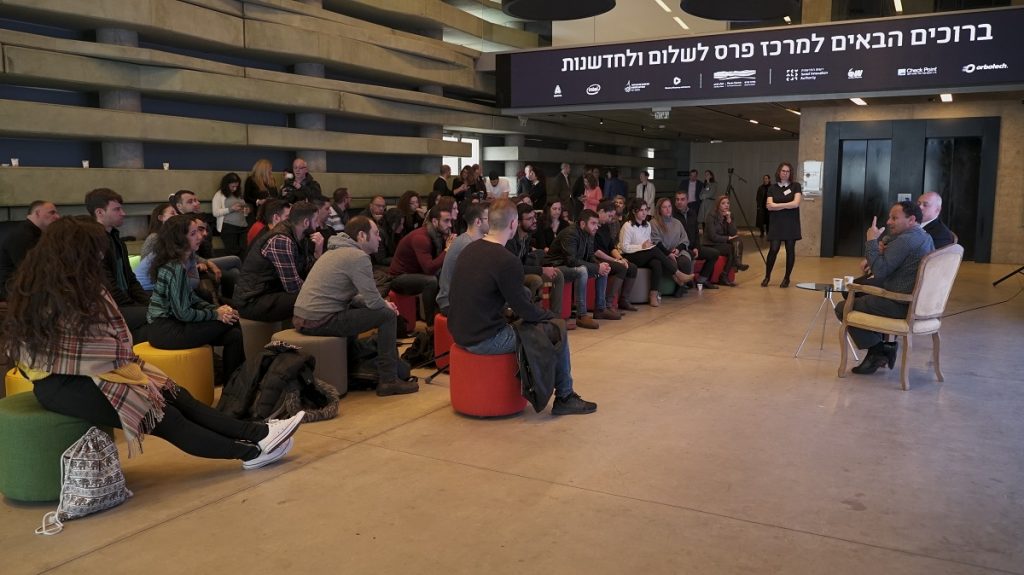
“This is a program for people who may have not been exposed to entrepreneurship and don’t necessarily come from the high-tech world,” she tells NoCamels.
The Peres Center partnered with TAU Ventures, the venture capital arm of Tel Aviv University, Masschallenge Israel, Cityzone, Tel Aviv’s living lab for smart city technology, and the Edmond de Rothschild Foundation for the venture.
As part of the program, participants will attend workshops, boot camps, and hackathons and work with mentors from Israeli municipalities to develop a solution or service, build a business model, conduct market research, and potentially gain investments.
They will also network with key players in the Israeli innovation ecosystem and build connections.
Indeed, the initiative focuses on pure potential and participants were chosen, out of 180 applicants, by a panel of judges based on character traits, motivation, and leadership, rather than the ideas themselves, she explains.
In fact, no ideas were yet presented and part of the program is to work in teams to establish and develop solutions and initiatives for smart cities. No previous experience or knowledge in the field was required.
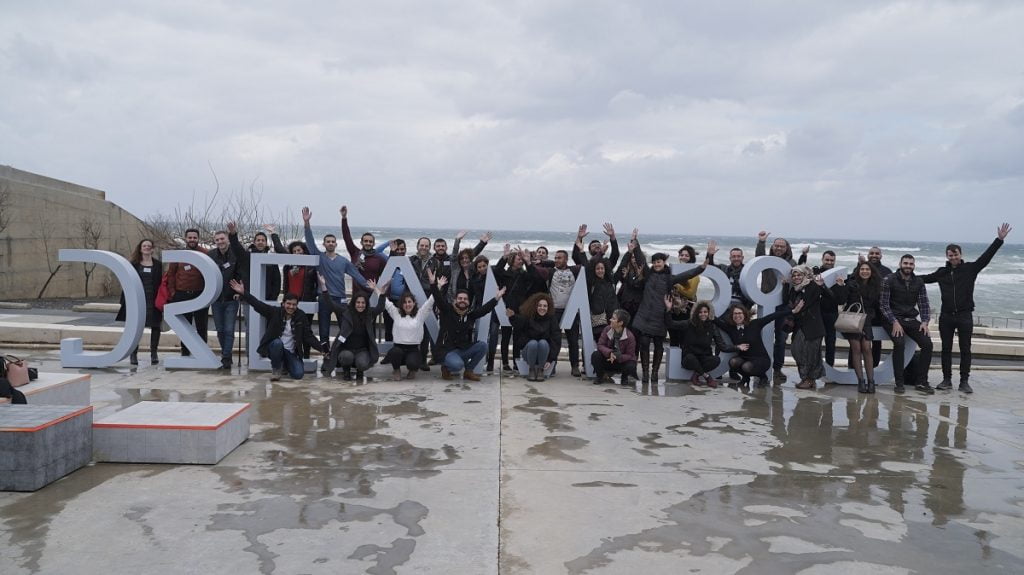
There is also a wide age range: participants are aged 22 to 56 and their backgrounds are very diverse. Some are still students while others have careers in law, electrical engineering, criminology, and optometry. And many are from northern Israel, where there are large Arab-Israeli and Druze-Israeli communities.
Hasan Mitwalli, a Palestinian professional from East Jerusalem who holds Israeli residency, tells NoCamels he is taking part in the program to develop entrepreneurial and networking tools he hopes to apply to his own endeavors in the future.
Mitwalli works in the tourism industry as a tour guide specializing in politics and culture, and has started giving tours on the tech industry. He tells NoCamels he heard of “Starting-Up Together” after getting involved in a young company based in the West Bank city of Ramallah.
“I was trying to network with Israeli colleagues and I was looking at and going to anything [program or event] that came to me, until an acquaintance sent me information about this program. I applied, was invited for an interview and I was in,” he says.
Recently, Mitwalli co-founded a small startup, registered in Israel, that focuses on the tourism industry, providing logistics solutions to tour operators and participants alike through a mobile app. Users can look at their tour programs, check out maps and photos, and read short descriptions of sites they plan to visit.
So where does smart city tech fit it? “It’s an idea to get your brain going, to come up with ideas that will solve problems for people,” says Mitwalli. “I really like the concept.”
Basch-Hadari emphasizes that “the goal here is the process, it’s not an end product. We are providing the tools for them to learn and to grow, to network in mixed groups.”
Sign up for our free weekly newsletter
SubscribeMitwalli says he welcomes the built-in diversity. “There are people from the Golan Heights, who also have a unique identity [a majority of Druze from the Golan identify as Syrian and do not have Israeli citizenship], Bedouins from the Negev, Palestinians from East Jerusalem, half of the group is made up of women, so it’s very important what this program is doing.”
Israel’s Arab communities are severely underrepresented in Israel’s innovation ecosystem. According to research by Israeli non-profit Start-Up Nation Central (SNC), the Arab population makes up just three percent of the workforce in the sector.
There are a number of initiatives aimed at increasing participation, including one by SNC launched late last year in partnership with Israeli NGOs, high-tech companies, philanthropists and government leaders. The Israel Innovation Authority, the Israeli government’s support arm for local innovation and R&D, has also stepped in, launching initiatives meant to increase targeted support to the community through coding boot camps and funding to local startups and businesses that train diversified populations.
Mitwalli tells NoCamels there should also be more initiatives aimed at hiring Palestinian tech professionals to answer a severe shortage in the high-tech workforce in Israel that is estimated at up to 15,000.
SEE ALSO: Hire The Neighbors: Could Israeli-Palestinian Tech Initiatives Prove To Be A Win-Win Arrangement?
“We have the privilege of living together, of building a unique society,” Chemi Peres, chairman of the Peres Center and son of the late Israeli president Shimon Peres (for whom the center was founded), told the group of 45 participants in his opening remarks in Jaffa on Sunday.
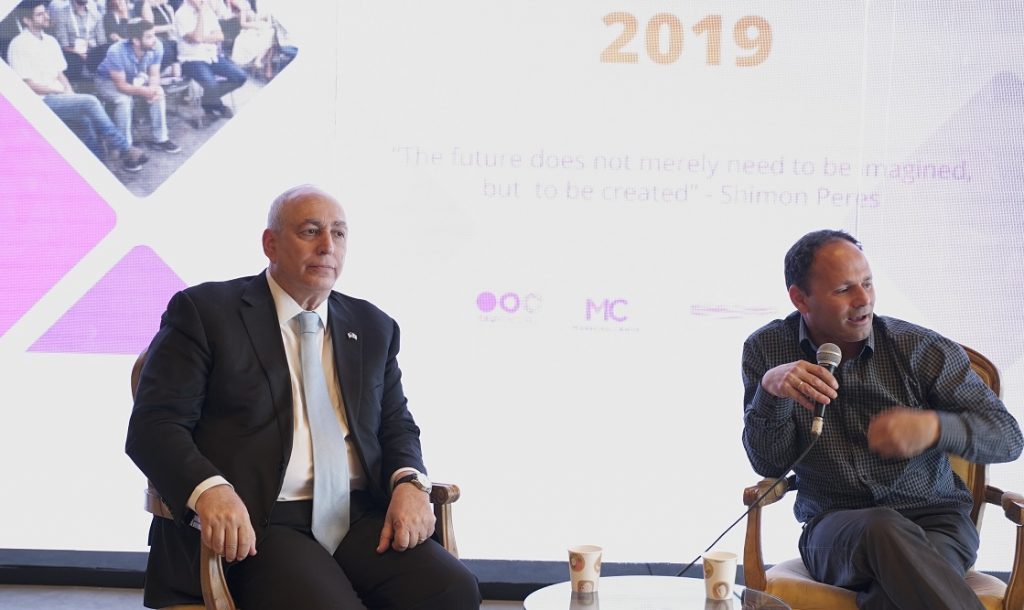
Photo by Roei Hirsch
“Our ability, as a society, to grow and develop depends on innovation, on initiatives, on entrepreneurs and on peace; these are our values,” he said.
Elli Booch, the director of philanthropy at the Edmond de Rothschild Foundation, said “entrepreneurship is not just about investing in something, it’s an approach to life, how you think, how you handle situations.”
“Through tech and innovation, we can change the world. Here at the Peres Center, we highlight the best of Israel,” added Peres, who is also the co-founder of Israel’s largest venture capital fund, Pitango Ventre Capital, which invests in Israeli technologies.
Israeli Achievements at the Peres Center
The Peres Center is a monument to Israel’s achievements over the past seven decades, from a dusty, resource-scarce country to a powerhouse of military technologies, cybersecurity, and agriculture.
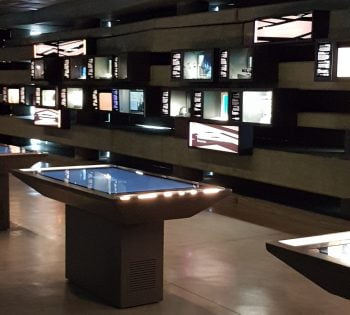
Display screens at the Peres Center for Peace and Innovation, February 2019. Photo by NoCamels Staff
The Peres Center for Peace was founded in 1996 by Shimon Peres, the Nobel Prize-winning elder Israeli statesman who advocated for peace with the Palestinians and Israel’s neighbors, and one of the architects of Israel’s peace agreements with Egypt and Jordan. The center rebranded as the Peres Center for Peace And Innovation after the establishment of an innovation wing for Israel, one of Peres’ flagship projects before his passing in 2016 at 93. Peres was a champion of Israeli technologies and Israeli startups.
The innovation center officially opened its doors in October 2018 in an inauguration ceremony attended by hundreds of people including representatives of tech giants such as Facebook, Google, and eBay. Government and business delegations from around the world also attended, including from Indonesia, Singapore, India, Africa, USA, Italy, France, Australia, the UK, South Korea, Mexico, Switzerland, Russia, and Germany.
SEE ALSO: Israel Sees Slow But Growing Integration Of Arab Community Into High-Tech Sector
The visitors’ wing highlights Israeli innovation through the ages, drawing on advanced technologies for highly visual platforms and interactive displays showing life-changing, cutting-edge tech developments.
Visitors can also experience the “capsule,” a formidable structure that looks vaguely like a high-tech tunnel, enhanced with VR capabilities, where one can catch a glimpse of the future of transportation, medicine, or artificial intelligence.
The center also hosts an exhibition of products or services by 45 startups and companies which changes every year. Currently, the exhibit includes companies such as OrCam, Intuition Robotics, Cortica, Vayyar, and Lishtot.
“The launch of the Israeli Innovation Center at the Peres Center is the realization of my father’s dream of showcasing under one roof the scientific and technological power of the State of Israel, and its contribution to the advancement of a better world,” Chemi Peres said at the time.
Related posts

Editors’ & Readers’ Choice: 10 Favorite NoCamels Articles

Forward Facing: What Does The Future Hold For Israeli High-Tech?

Impact Innovation: Israeli Startups That Could Shape Our Future


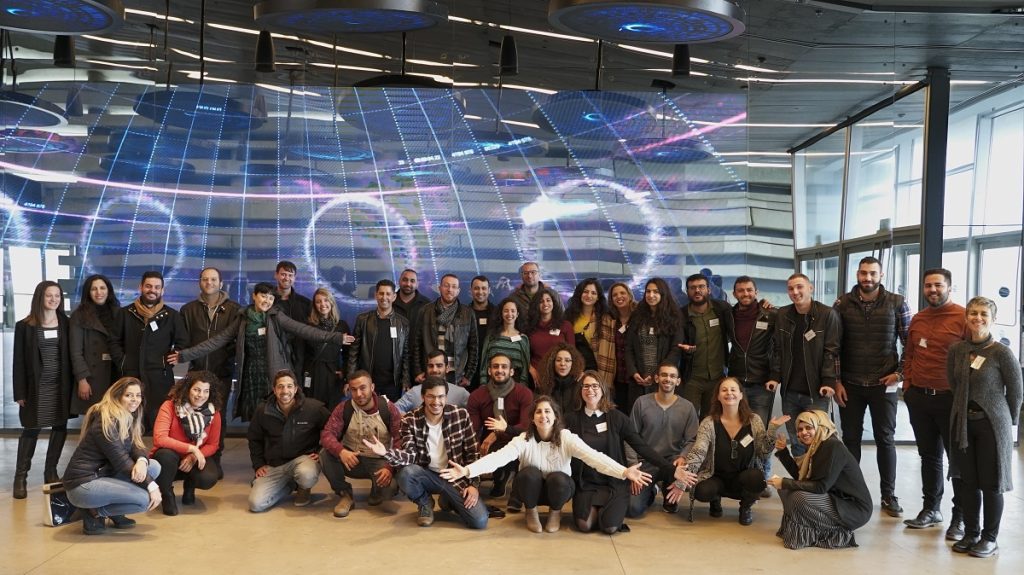
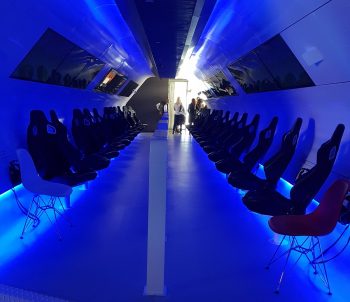

Facebook comments